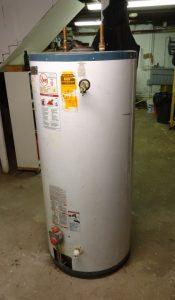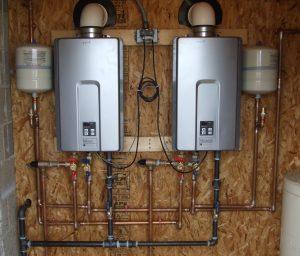Traditional vs. Tankless Hot Water Heaters
A hot water heater is an essential part of the home. From hot showers to dishwashers, having hot water on demand is necessary for our everyday lives. So, how do homeowners decide between traditional or tankless water heaters for their home?
What is a Traditional Water Heater?

A traditional water heater provides heat for the home by storing and pre-heating water. The water, usually contained in a 30-50 gallon water heater, is then available to be used when someone in the house turns on hot water for the sink, shower, etc. Once the stored water has been used, it then reheats it again for a future use.
What is a Tankless Water Heater?

A tankless water heater doesn’t pre-heat water. Instead it heats water on demand by using a heat source, either electric or gas.
Traditional Water Heaters vs Tankless Heaters
Price
A traditional water heater can result in a high monthly utility bill. There is no control over when water is heated so you are paying for heated water even when you don’t need it. However, it comes with a lower one-time installation fee.
According to the Department of Energy, a tankless heater can be 24-34% more energy efficient than a conventional heater. This results in lower lifetime cost of utilities, and savings of up to $100 annually. However, you could still be spending up to $4,500 on installation up front depending on variables such as size and whether the unit is running on gas or electric. If a tank-less system is retrofitted to a space that previously ran off of a traditional heater, that price will also increase.
Installation
In addition to the upfront cost of the installation, the logistics of installation is an important element as well. Typically, a traditional system is less time consuming to install. However, traditional heaters are notoriously big and bulky, and cannot be placed outside. For those with a smaller home, the space limitations involved can make the process difficult.
A tankless heater takes up much less space. It can be easily mounted to a wall or placed outside. However, installation is a more labor intensive process, especially if it needs to be retrofitted.
Availability of Hot Water
A traditional water heater can run out of hot water. If you are showering when the stored hot water is running low, you may be greeted by an unexpectedly cold surprise. They are inconvenient for large families that have to use more water or those that like to do laundry and dishes at the same time.
By contrast, a tankless heater can deliver two to three gallons of hot water as needed, which means you will never run out.
Replacement
A traditional water heater only has a lifetime expectancy of 10-15 years, but it is easier and less expensive to replace. The lifetime expectancy of a tankless heater is 20 or more years.
Adams and Son Plumbing will help you with any questions you have about which option is best for your home. Our state-certified plumbers are water heater experts with years of installation and repair experience. Contact Adams and Son Plumbing for your pluming needs today.

